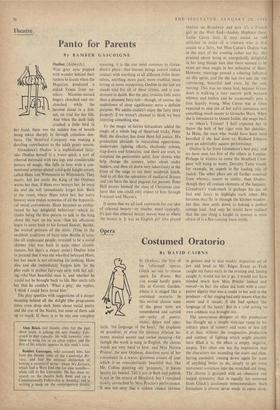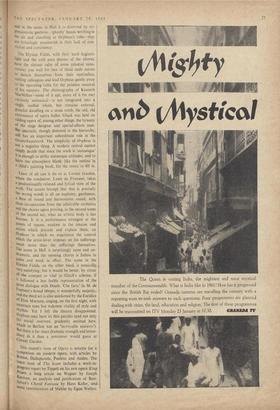Opera
Costumed Oratorio
By D tVID CAIRNS IN Orpheus, the first of his 'reformed' operas, Gluck set out to rescue opera for drama. But you would hardly guess this at Covent Garden, where it is staged like a costumed oratorio. In this revival almost none of the great texts are remembered and carried out—unity of poetry, music, dance and spec- tacle, the language of the heart,' the emphasis on grandeur, or even the intimate relation be- tween musical accent and verbal meaning—for though the work is sung in English, the chorus words are very hard to hear, and Miss Norma Procter, the new Orpheus, dissolves most of her consonants in a warm, glutinous stream of tone which is •so conscientiously beautiful that, like Mr. Collins pointing out 'prospects,' it leaves beauty far behind. Tell it not in Bath and publish it not in the streets of Hereford, but I remained stonily untouched by Miss Procter's performance. It was not only that a sudden chance likeness in gesture and in that weakly imperious set of jaw and head to Mr. Edgar Evans as Froh caught my fancy early in the evening and, having caught it, would not let it go. I would not have minded much how Miss Procter looked and moved—in fact she often did both with a com- petent dignity that was a credit to her and to the producer—if her singing had only meant what the music said it meant; if she had spoken 'the language of the heart.' But in a cold setting its own coldness was brought out.
The anonymous designer of this production has thought up a simple staircase ramp as his solitary piece of scenery and more or less left it at that; without the imaginative production and subtlety of lighting which might possibly have filled it in, the effect is empty, negative, aseptic. Too often one has the impression that the characters are ascending the stairs and then, having ascended, coming down again for want of anything better to do, simply to get sonic movement somehow into the wretched old thing. The chorus is grouped with an obsessive and insipid symmetry that is equally far removed from Gluck's passionate monumentalism. Such formalism is almost never made to come alive; and in the scene in Hell it is distorted by ex- pressionistic gestures---`ghostly' hands writhing in the air and clutching at Orpheus's robe—that are irritatingly amateurish in their lack of con- viction and consistency.
The Elysian Fields, with their hard hygienic light and the cold pure dresses of the chorus, have the sinister calm of some celestial sana- torium; you wait for two of those male nurses to detach themselves from their motionless, smiling colleagues and lead Orpheus gently away to the operating table for the painless removal of his memory. The choreography of Kenneth MacMillan—some of it apt, more of it (to me) curiously unmusical—is not integrated into a single, unified whole, but remains external, graceful doodling on a stone tomb, the old, old excrescence of opera ballet. Gluck was bent on ridding opera of, among other things, the tyranny of the stage designer and special-effects man. but spectacle, though demoted in the hierarchy, still has an important subordinate role in the Gesainikunstwerk. The simplicity of Orpheus is not a negative thing. A modern revival cannot simply decide that since the work is 'statuesque' it is enough to strike statuesque attitudes, and to leave the atmosphere blank, like the outline in a child's painting book, for the music to fill in.
Least of all can it do so at Covent Garden, Where the conductor, Louis de Froment, takes a predominantly relaxed and lyrical view of the Work. The accent (except that that is precisely the wrong word) is all on euphony, gentleness, flow of round and harmonious sound, with Close co-operation from the admirable orchestra and the chorus again proving, in the second scene of the second act, what an artistic body it has become. It is a performance strongest at the Points of repose, weakest in the tension and action which precede and explain them; an Orpheus in which we experience the control Which the artist-lover imposes on his sufferings much more than the sufferings themselves. The scene in Hell is surprisingly tame and un- dramatic, and the opening chorus is listless in Pulse and weak in effect. The scene in the Elysian Fields, on the other hand, is musically very satisfying; but it would be better, by virtue of the contrast so vital to Gluck's scheme, if it followed a less feeble representation of ,the great dialogue with Death. 'Che faro,' in M. de Fronient's broad tempo, is wonderfully majestic, and the third act is also quickened by the Euridice of Elsie Morison, singing, on the first night, with uncertain tone but welcome vitality of style and rhythm. Yet I left the theatre disappointed. °I'Pheets may have its thin patches (and not only the trivial overture, prudently omitted here, which to Berlioz was an 'incroyable niaiserie). l!ut there is far more dramatic strength and imme- diacy in it than a newcomer would guess at Covent Garden.
This month's issue of Opera is notable for a sYmPosium on modern opera, with articles by Britten, Dallapiccola, Poulenc and Auden. The latest issue of The Score includes a work-in- Progress report by Tippett on his new opera King Priem, a long article on Wagner by Joseph Kerman, an analysis and justification of Beet- hoven's Choral Fantasia by Hans Keller, and Wine reminiscences of Mahler by Egon Wellesz.



































 Previous page
Previous page